The effect of coffee varieties on flavor The difference between Elida Cardoba and iron pickup
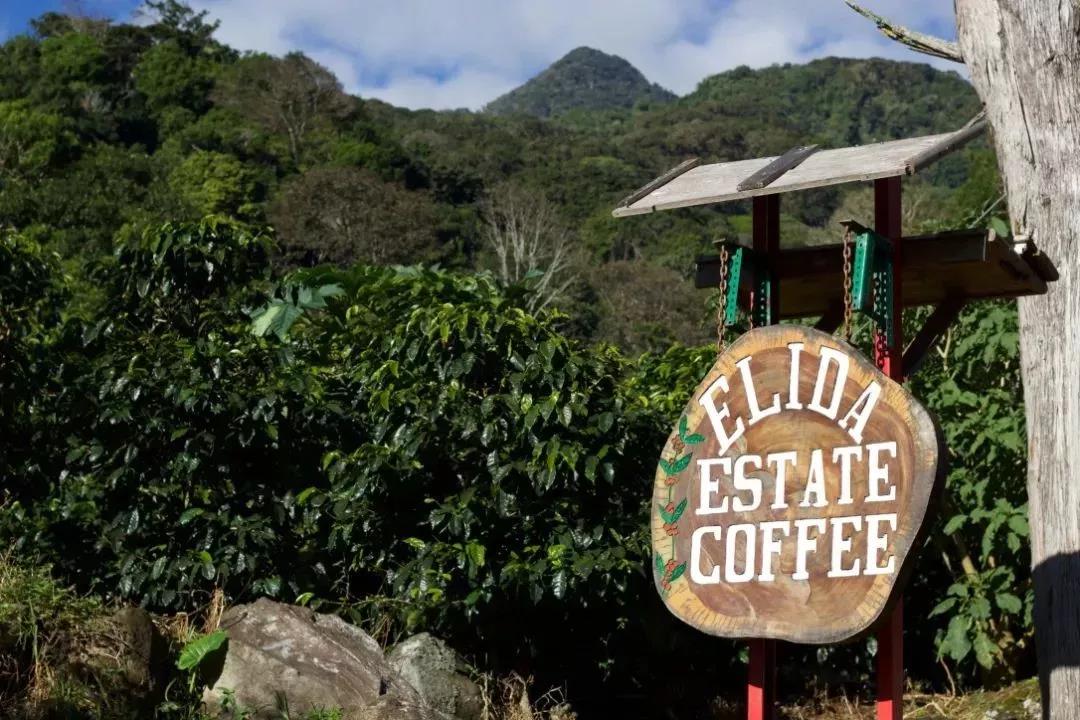
As a hundred-year-old Alida Manor, the coffee produced here has always been of good quality. Alida Manor in Panama is located in Pokuit, a well-known boutique coffee producing area in Panama. Erida Manor has a total area of 65 hectares, more than half of which is within Baru Volcano National Park, only 30 hectares are used for planting coffee trees, and the rest are virgin forests.

The estate, where coffee is grown from 1670 to 1850 meters above sea level, is one of two coffee estates at high elevations in Panama (the other estate is located at Carmen in the Vulcan Valley. )
At such a high altitude, the low temperature delayed the ripening of the coffee berries, about a month later than the normal ripening period, while the fertile volcanic soil provided sufficient nutrients for the coffee, coupled with the good microclimate brought by the Baru volcano, Alida Manor was able to achieve good results in cup test competitions.

In addition to the unique ultra-high altitude and microclimate, Mr. Wilford, the owner of the manor, has also made considerable efforts in harvesting and processing. In order to meet the highest standards, Alida's coffee is only allowed to pick the most ripe coffee fruit (Ripe on Pinton) by hand with high maturity and natural high sugar content of pectin, which is also the basis of Arida's high-quality flavor.

Mr. Wilford, the owner of the estate, in addition to the extremely strict treatment of coffee cultivation, the "purification" of raw beans is also more stringent than those of the same industry. In the case of Alida of Panama, after the raw beans are processed, they need to go through more than 5 months of low-temperature Resting to remove green, so that the flavor of coffee can be more balanced and full development.
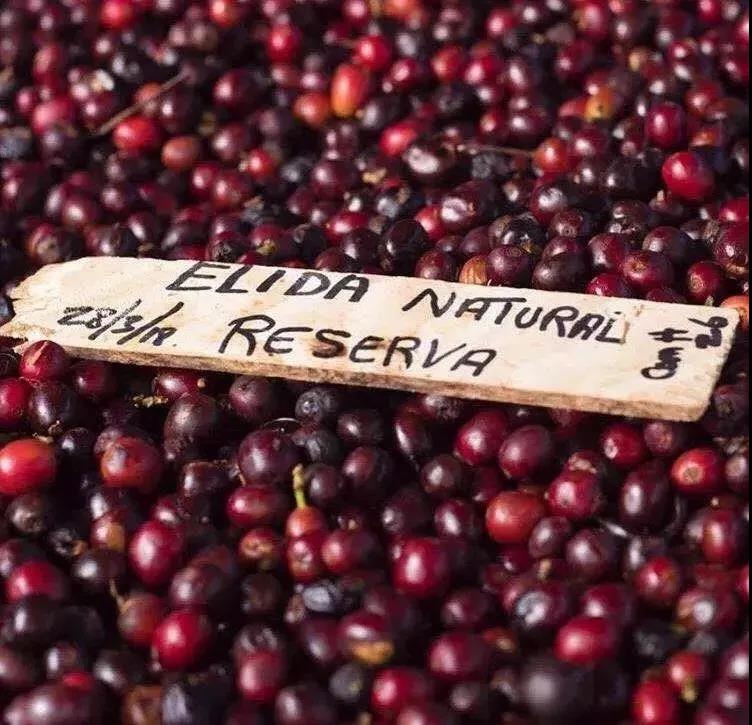
(low-temperature Resting is a concept of raw bean purification that was vigorously promoted by coffee master George Howell in 2006. We found that raw beans in subtropical places need to be kept at low temperature, but different treatments and elevations will change the time of low-temperature Resting. For Alida, Panama, 5 months of low-temperature Resting is the best.)
Treatment method
[sun exposure]
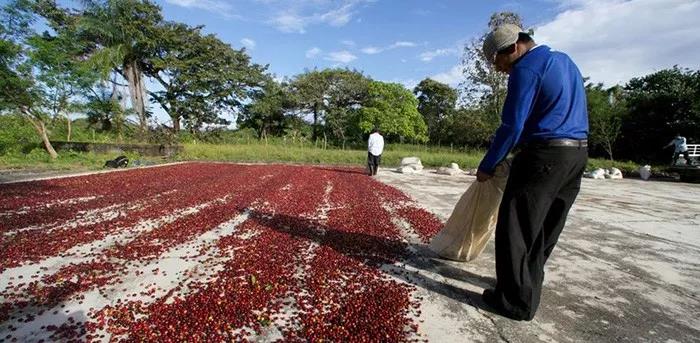
Pour the harvested coffee fruit into a big trough, and the ripe and full fruit will sink to the bottom of the water and remove the floating beans. Put the whole coffee fruit with meat and belt in the sun on the bean drying farm and naturally dry to about 12% of the water content, which takes about two to four weeks. Finally, the peeling machine is used to remove the hard peel, pulp and sheep skin, and the raw beans appear.
The advantages of solarization
1. Simple, low processing cost.
two。 Raw beans are naturally dried in the pulp and absorb the essence of the fruit, so the fruit is rich, sweet and mellow.
There are three main varieties in Alida Manor, namely, Catuai (Kaduai), Typica (Iron pickup) and Geisha (Rose Summer). The processing plant of the manor is halfway up the hillside. After the coffee is picked, it can be transported to the factory for processing as soon as possible to ensure that the quality of the coffee fruit will not be affected.
Although they all come from the same manor and the treatment is the same, different varieties will bring different flavors. Today, let's take a look at the same beans from Alida Manor. What is the effect of different varieties of coffee on the flavor?
Variety comparison
Iron pickup Typica

Typica is one of the ancient varieties of Arabica coffee discovered today, and the other is called bourbon. The Arabica species originated in Ethiopia, where it still grows naturally today in the highlands of the pristine rainforest.

The Ironpika bean is slender, the tree is tall, the fruit is oval, and the branches are slightly inclined. The iron pickup is slender and unfolding, with a tilt angle of 50 Mel 70 degrees. The coffee yield of each tree is very low, but the cup test score is very high.
Kaduai Catuai
Kaduai is a hybrid of New World and Kaddura. The variety name Catuai comes from the vernacular, meaning "very good (very good)".

It inherits the advantages of the low height of Kaddura, helps inherit the advantages of the low height of Kaddura, changes the shortcomings of the new world, and makes up for the weakness of Arabica fruit. The result is solid, and it is not easy to fall when the strong wind blows. The biggest regret is that its overall flavor is slightly more monotonous than Kadura. In the 1950s and 1960s, it was excavated by the Brazilian Agricultural Research Institute. It first appeared in the late 1940s.

As a member of Arabica family, Catuai is relatively high-yielding. The plant is relatively short, and the angle between the lateral branch and the main branch is small. In addition to higher yield, coffee cherries will not easily fall after ripening, strong resistance to wind and rain, is also another prominent advantage of this species. Loved by windy and rainy producing areas. In addition, adequate fertilization and care are needed.

From the perspective of raw beans, both kinds of beans are yellow in color and smell fermented fruit. The two ends of Alida's iron pickup are slightly warped, the shape is oval, and the bean body is thin from the side, while Kaduai looks smaller and round.
Baking comparison
Alida iron pickup
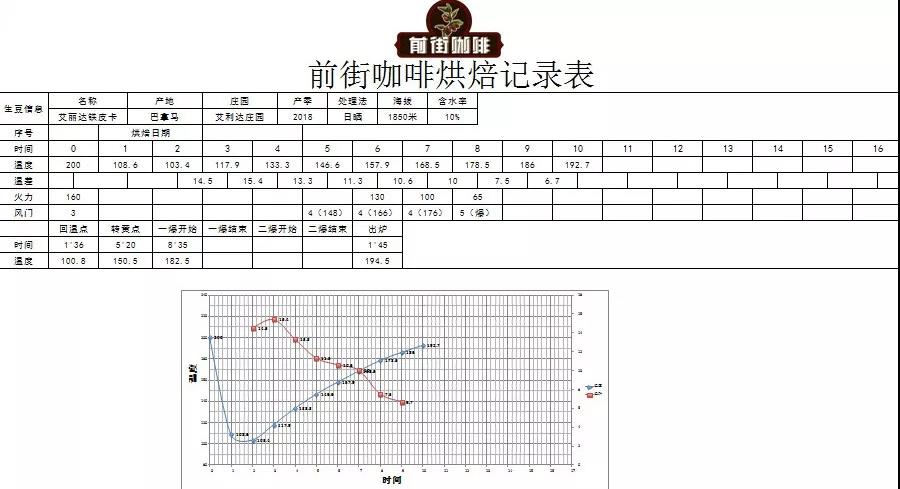
Roaster Yangjia 600g semi-direct fire
The furnace temperature is 200 degrees Celsius, the throttle is set at 3, the firepower is adjusted to 160 degrees, the throttle is unchanged, the temperature recovery point is 30 degrees 39, and the firepower is adjusted once at 148 degrees Celsius. At this time, the bean table turns yellow, the smell of grass disappears completely, dehydration is completed, and the firepower remains unchanged. Throttle adjusted to 4.

7 & # 39th 45 ", ugly wrinkles and black markings appear on the bean surface, and the smell of baked bread obviously turns into coffee, which can be defined as a prelude to an explosion. At this time, listen clearly to the sound of the explosion point, to 8 degrees 39" 35 "start an explosion, adjust the firepower to 65 degrees, the throttle is fully open (adjust the firepower to be very careful, not so small as to be free of bursting sound), after an explosion, 1 percent 39 fights 45", 194.5 degrees in the pan.
Alida Kaduai

Roaster Yangjia 600g semi-direct fire
The furnace temperature is 200 degrees Celsius, the throttle is set at 3, the firepower is 160 degrees, the temperature recovery point is 39 degrees 30, the firepower is adjusted once at 152 degrees, and the air door is opened to 4, at this time the bean surface turns yellow, the smell of grass disappears completely, and the dehydration is completed. At 166 degrees, the firepower is adjusted to 130 degrees, and the throttle remains unchanged.

7 & # 39 position 43 ", ugly wrinkles and black markings appear on the bean surface, and the smell of toasted bread obviously turns into coffee, which can be defined as a prelude to an explosion. At this time, listen clearly to the sound of the explosion point, start to explode to 8 degrees 39", adjust the firepower to 80 degrees, adjust the throttle to 5 (the firepower should be very careful, not so small as to be free of bursting sound), 1 percent 3945 "after an explosion, 195.5 degrees into the pot.
Flavor comparison
Cup test
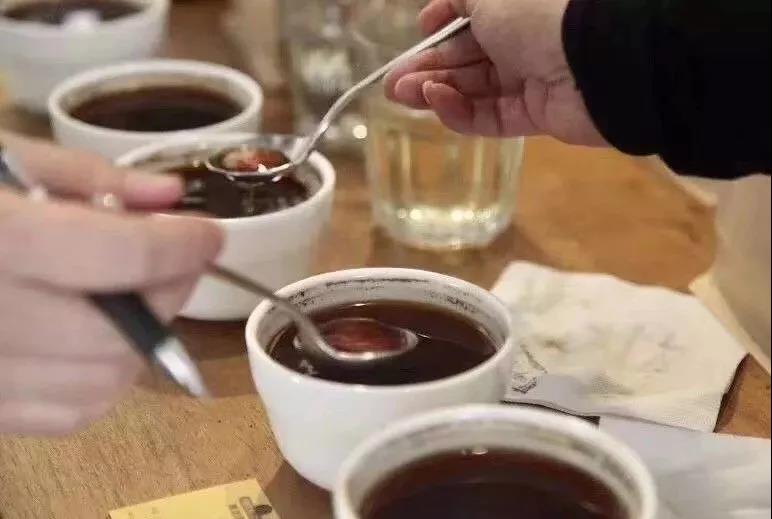
[Alida Tieka]: it has fermented fruit and jasmine aromas, sour notes of imported peaches and oranges, sweet and sour notes, obvious sweetness of raisins and sugar, and sweetness as a whole.
[Arida Kaduai]: it has the aromas of fermented wine and roses, with aromas of berries, citrus and green tea on the palate, with a sweet finish of cream, nuts and sugar.
Hand punch
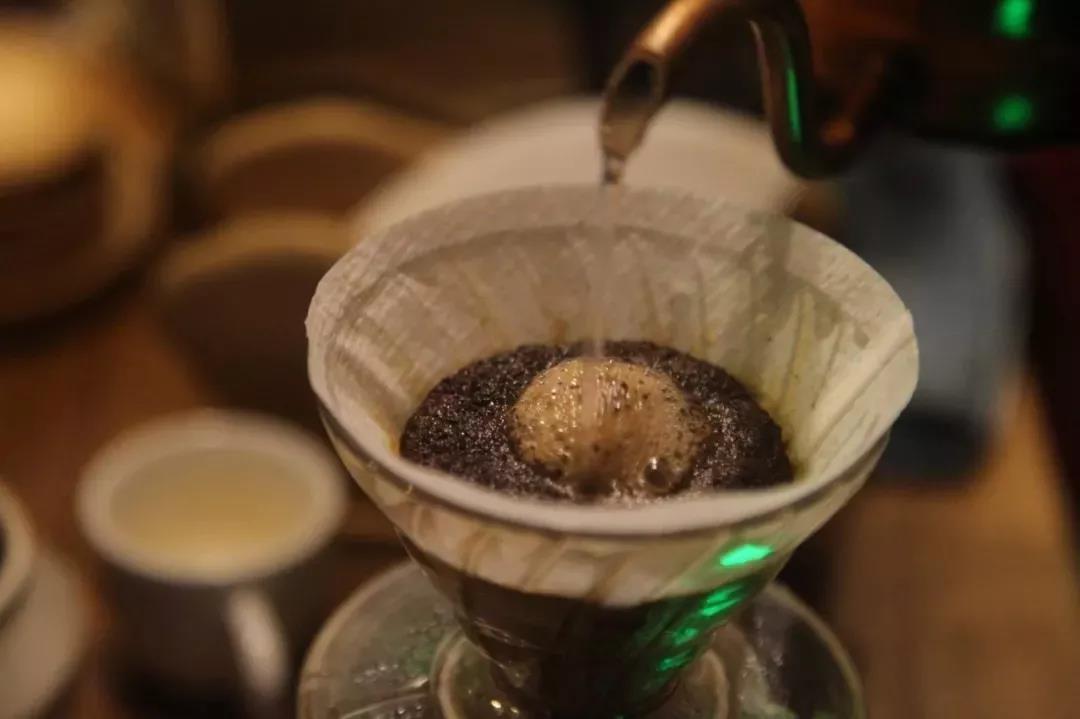
Filter cup: V60
Water temperature: 89 ℃
Degree of grinding: BG 5R (pass rate of Chinese standard No. 20 screen 58%)
Powder / water ratio: 1:15
Technique: 30 grams of water steaming for 30 seconds, small water slowly injected to 125 grams for segments, and so on when the water level is about to reveal the powder bed, continue to inject water to 230 grams of water.

[Alida Tieka]: imported orange, citrus acid notes, with fermented wine aromas, raisins, preserved fruit sweet, sour and sweet shock, black tea aftertaste, sugar, caramel back sweet lasting.
[Arida Kaduai]: imported citrus, berry acidity, raisin sweetness, nutty, chocolate, cream flavor, pine nut finish.
By comparison, it is found that Alida's iron pickup will prefer the sweetness of preserved fruit, while Kaduai has some nutty and chocolate flavor. So even if the beans grow in the same manor and grow at similar elevations, the varieties are different, and the flavor is also different.
Important Notice :
前街咖啡 FrontStreet Coffee has moved to new addredd:
FrontStreet Coffee Address: 315,Donghua East Road,GuangZhou
Tel:020 38364473
- Prev
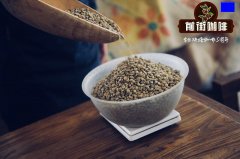
The Secret and Flavor description of the treatment of Golden Honey in the Pearl Paloma Manor of Costa Rica
Professional coffee knowledge exchange more coffee bean information please follow the coffee workshop (Wechat official account cafe_style) Costa Rica Pearl Paloma Manor Golden Yellow Honey (Villa Sarchi) Costa Rica La Perla-El Palomar-Gold Honey Costa Rica Pearl Paloma Manor from the comprehensive honey treatment launch day further ● style
- Next

Description of the characteristics and Flavor of Colombian Coffee is there any good brand of Colombian coffee?
Professional coffee knowledge exchange more coffee bean information please follow the coffee workshop (Wechat official account cafe_style) Colombia is the world's third largest coffee producer and exporter (the first is Brazil, the second is Vietnam) is the world's largest exporter of Arabica coffee beans, Colombia and the largest coffee producer Brazil, the northwest is bordered by Panama, we know Panama is rich
Related
- Detailed explanation of Jadeite planting Land in Panamanian Jadeite Manor introduction to the grading system of Jadeite competitive bidding, Red bid, Green bid and Rose Summer
- Story of Coffee planting in Brenka region of Costa Rica Stonehenge Manor anaerobic heavy honey treatment of flavor mouth
- What's on the barrel of Blue Mountain Coffee beans?
- Can American coffee also pull flowers? How to use hot American style to pull out a good-looking pattern?
- Can you make a cold extract with coffee beans? What is the right proportion for cold-extracted coffee formula?
- Indonesian PWN Gold Mandrine Coffee Origin Features Flavor How to Chong? Mandolin coffee is American.
- A brief introduction to the flavor characteristics of Brazilian yellow bourbon coffee beans
- What is the effect of different water quality on the flavor of cold-extracted coffee? What kind of water is best for brewing coffee?
- Why do you think of Rose Summer whenever you mention Panamanian coffee?
- Introduction to the characteristics of authentic blue mountain coffee bean producing areas? What is the CIB Coffee Authority in Jamaica?

